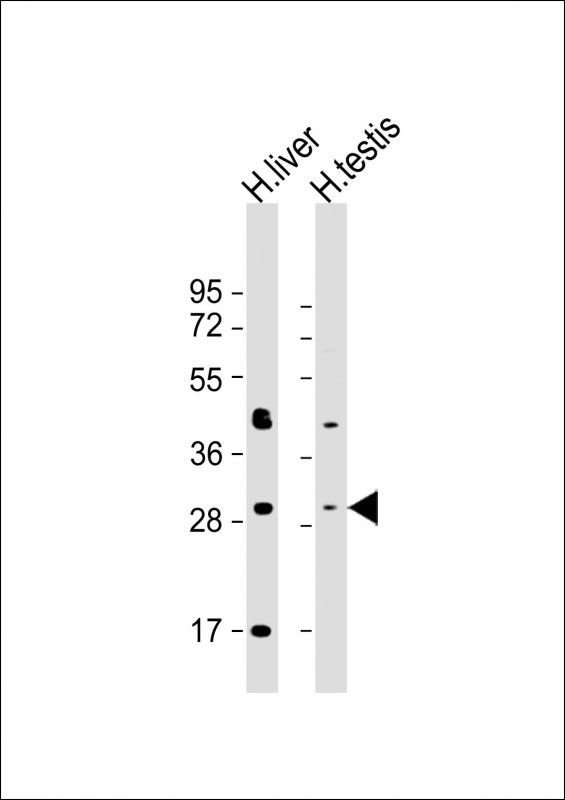
| WB | 1/8000 | Human,Mouse,Rat |
| IF | 咨询技术 | Human,Mouse,Rat |
| IHC | 咨询技术 | Human,Mouse,Rat |
| ICC | 技术咨询 | Human,Mouse,Rat |
| FCM | 咨询技术 | Human,Mouse,Rat |
| Elisa | 咨询技术 | Human,Mouse,Rat |
| Aliases | 3-oxo-5-alpha-steroid 4-dehydrogenase 1, 1.3.1.22, SR type 1, Steroid 5-alpha-reductase 1, S5AR 1, SRD5A1 |
| Entrez GeneID | 6715 |
| WB Predicted band size | 29.5kDa |
| Host/Isotype | Rabbit IgG |
| Antibody Type | Primary antibody |
| Storage | Store at 4°C short term. Aliquot and store at -20°C long term. Avoid freeze/thaw cycles. |
| Species Reactivity | Human, Mouse, Rat |
| Immunogen | This SRD5A1 antibody is generated from a rabbit immunized with a KLH conjugated synthetic peptide between 153-184 amino acids from the Central region of human SRD5A1. |
+ +
以下是关于SRD5A1抗体的3篇参考文献,包含文献名称、作者及摘要内容概述:
---
1. **文献名称**: *"Production and characterization of a monoclonal antibody against human steroid 5α-reductase type 1"*
**作者**: Li X, Chen C, Singh SM, Labrie F
**摘要**: 该研究开发了一种针对人SRD5A1的单克隆抗体,通过免疫小鼠并筛选杂交瘤细胞获得。抗体特异性经Western blot和免疫组化验证,可用于检测多种组织中的SRD5A1蛋白表达,为研究其在雄激素代谢中的作用提供工具。
---
2. **文献名称**: *"Differential expression of 5α-reductase isozymes in prostate cancer and its implications for androgen regulation"*
**作者**: Thomas LN, Lazier CB, Gupta R, et al.
**摘要**: 研究利用SRD5A1和SRD5A2特异性抗体分析前列腺癌组织中两种同工酶的表达差异。结果显示,SRD5A1在恶性组织中高表达,提示其可能通过局部DHT生成促进肿瘤进展,抗体应用为靶向治疗提供依据。
---
3. **文献名称**: *"Immunohistochemical localization of 5α-reductase type 1 in the human skin"*
**作者**: Sawaya ME, Price VH, Harris S, et al.
**摘要**: 通过SRD5A1抗体进行免疫组化分析,发现该酶在毛囊皮脂腺中高表达,尤其在男性型脱发患者的头皮组织中活性增强,表明其在毛囊周期及脱发病理中的关键作用。
---
这些文献涵盖了SRD5A1抗体的开发、验证及其在疾病机制研究中的应用,确保信息的学术可靠性。
The **SRD5A1 antibody** targets the enzyme **steroid 5α-reductase type 1 (SRD5A1)**, a key player in steroid metabolism. SRD5A1 catalyzes the irreversible conversion of testosterone to dihydrotestosterone (DHT), a potent androgen critical in regulating physiological processes like sexual development, prostate growth, and hair follicle dynamics. Unlike SRD5A2 (its isoform), SRD5A1 is broadly expressed in non-reproductive tissues, including the skin, liver, and adrenal glands, and is implicated in conditions such as androgenetic alopecia, hirsutism, and hormone-dependent cancers.
Antibodies against SRD5A1 are vital tools for studying its tissue distribution, enzymatic activity, and role in disease. They enable detection and quantification via techniques like Western blotting, immunohistochemistry (IHC), and immunofluorescence (IF). Researchers rely on these antibodies to investigate SRD5A1’s interplay with hormonal therapies (e.g., 5α-reductase inhibitors like finasteride) or its overexpression in pathologies like prostate cancer. Specificity is crucial, as cross-reactivity with SRD5A2 or other isoforms can confound results.
Commercial SRD5A1 antibodies are typically raised in rabbits or mice, often validated using knockout cell lines or siRNA-mediated silencing. Their applications span basic research, drug development, and clinical diagnostics, aiding in biomarker discovery and therapeutic targeting. Understanding SRD5A1’s regulation and function through antibody-based assays remains pivotal for advancing androgen-related biomedical research.
×